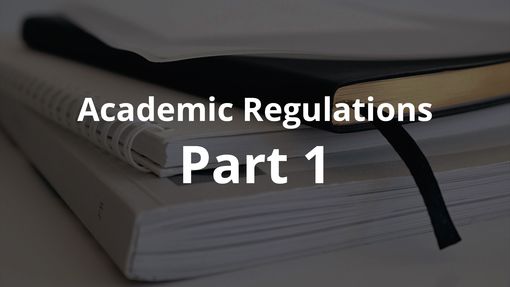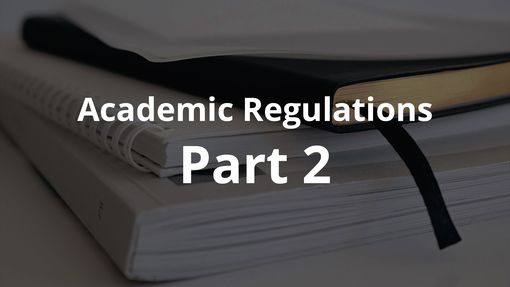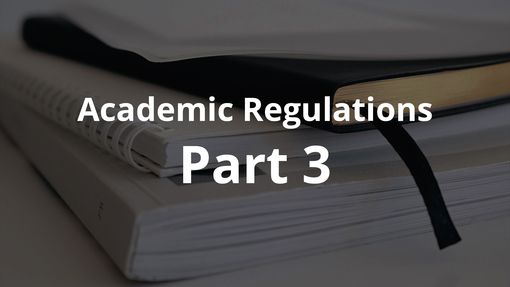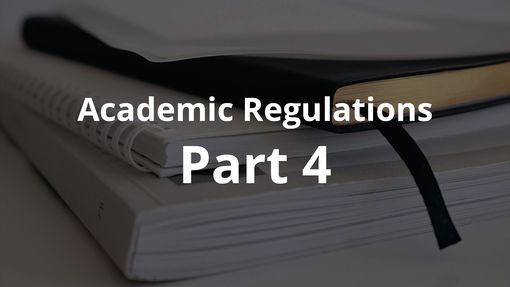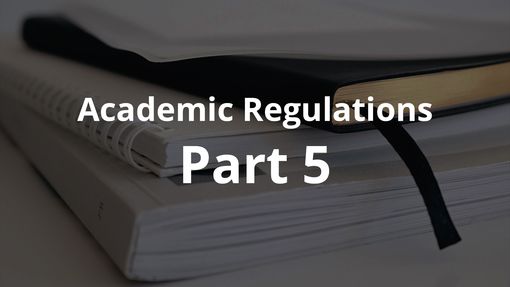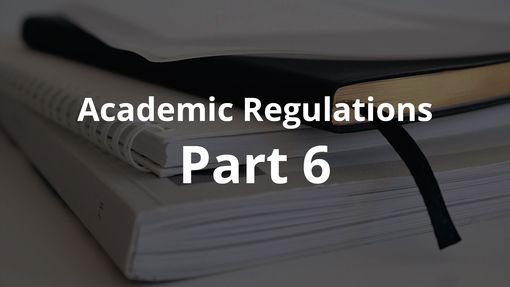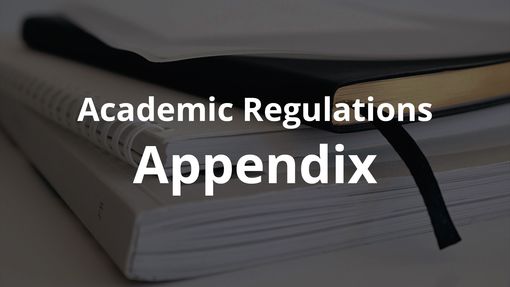Academic Regulations Part 4: Assessment and Progression
Contents
14. The Purposes, Principles and Responsibilities of Assessment
16. Viva Voce (Taught Programmes)
17. The Format and Operation of Assessment
18. Marking, Moderation, External Scrutiny and Feedback
21. Late Submission of Assessment
22. Mitigating Circumstances Which Adversely Affect Assessment
23. Extensions (Taught Programmes)
24. Failure In Assessment and a Unit
25. Compensation and Condonement
14. The Purposes, Principles and Responsibilities of Assessment
14.1 The assessment of students serves several purposes:
- to provide students with accurate information on their progress and performance, with the aim of helping them to reflect on and improve the quality of their knowledge, understanding, application and skills;
- to assist students’ learning by providing them with the opportunity to review, consolidate and demonstrate what they have learned;
- to measure the outcomes of students’ learning, in relation to the intended learning outcomes of the course and to national and professional frameworks and on this basis to make decisions about the standard of their achievement, their progression within the course, their eligibility for academic credit and awards and, where relevant, their competence for professional practice.
Principles of Assessment
14.2 Assessment should be fair, valid, reliable and appropriate to the level of award being offered.
14.3 Assessment should support the development, demonstration and (where relevant) measurement of the intended learning outcomes of the course.
14.4 Assessment tasks should be marked or graded in relation to explicit criteria. The forms, processes and implications of assessment tasks should be made clear to students, tutors and assessors, including visiting or learner support staff who have input to assessment.
Student Responsibilities in Assessment
14.5 It is the responsibility of students to familiarise themselves with the Regulations and other information on assessment in the course and student handbooks and of the deadlines to attend for assessment or to hand in work for assessment.
14.6 Unless otherwise provided through course validation, all written work submitted for assessment must be in English. Translations by a third party of work originally written by the student in a language other than English cannot be accepted.
14.7 Students must inform Neuro-Inclusion and Disability Service, with evidence, of any disability which they believe will cause them exceptional difficulties in undertaking specific assessment tasks. (See section 10 in the General Regulations).
14.8 Students who believe that their assessment has been adversely affected by unforeseen mitigating circumstances must follow the published procedure to disclose and evidence those mitigating circumstances using the relevant form and by the dates required. The Examination Board will not consider mitigating circumstances which have not been submitted, with evidence, by the required date (see section 22, below).
14.9 A student will be deemed to have made an attempt at assessment by the due date, whether or not they have actually submitted work for assessment, unless:
- an extension of time has been agreed in advance in accordance with the published extensions procedure;
- or an examination board has agreed deferral on grounds of mitigating circumstances.
14.10 A student who does not submit work for assessment by the due date, without an extension and without having provided evidence of mitigating circumstances accepted by the Examination Board, will fail the assessment (with a mark of 0% if percentage marks are given).
14.11 If the period of extension has expired, or if the date set for a deferred assessment has passed, but work has not been presented for assessment, the student will be deemed to have made an attempt and to have failed, unless evidence of continued mitigating circumstances is supported (see section 22, below).
15. Alternative Assessments
15.1 If a student cannot for good reason be assessed on a unit by the normal methods detailed in the Programme Specification, then the Examination Board (normally through the Chair) has the authority to approve alternative assessment methods.
15.2 The Examination Board must ensure that the alternative method(s) meets the course and unit objectives and that assessment outcomes are comparable in level and scope with those of the validated course unit(s).
15.3 Alternative assessment may be set if:
- an opportunity has arisen for a student to undertake a learning opportunity, external to the course and normally outside the School, which will support the student in achieving the learning outcomes of the validated unit or other agreed learning outcomes recognised by the external examiner as closely compatible and relevant to the course;
- a student has been required to withdraw from an assessment task (including a public production or performance) pending a disciplinary enquiry or Health, Wellbeing and Support for Study Procedures;
- a student is unable to undertake an assessment as a resit due to the nature of the task (e.g. a public production or other time-limited performance). Refer to paragraph 24.12, below.
15.4 The alternative assessment must be:
- designed by a member of staff with appropriate expertise (normally the relevant unit tutor);
- approved by the course leader;
- agreed with the appropriate external examiner;
- approved in advance by the Chair of the Examination Board.
15.5 Alternative assessment arrangements are normally approved by correspondence between the relevant parties. A copy must be lodged with the Secretary to the Examination Board to be held on the Examination Board file.
15.6 Alternative assessments will normally be set and marked by staff of the School.
15.7 If arrangements are made for an individual student or group of students to take part in a study abroad or exchange programme, the basis of assessment of students’ learning during that programme should be agreed and specified in writing before the beginning of the study abroad. Depending on the duration of the study abroad, and on the nature of the exchange institution, assessment may be on the basis of one or more of the following:
- assignment briefs set and marked by examiners at Central, based on learning elsewhere;
- acceptance of the pass/fail decisions of the other institution based on syllabi and assessment regimes known to the School;
- acceptance of pass/fail judgements made by the host institution and setting aside the work assessed abroad when determining classification;
- acceptance of marks awarded by the other institution, if appropriately moderated by a formula reflecting marking norms in different national or institutional systems.
16. Viva Voce (Taught Programmes)
16.1 The Examination Board has the discretion to examine any student viva voce in addition to the assessments specified in the Programme Specification and/or unit outline(s). This form of assessment is entirely distinct from any formal oral examination within the course and may be used:
- to determine difficult or borderline cases - the viva voce may be used only to raise and not to lower a student’s mark;
- as an alternative or additional assessment where valid reasons for poor performance have been established;
- to determine, where an assessment offence such as plagiarism is suspected but the source has not been identified, whether it is possible that the work submitted could have been the student’s own (refer to the Academic Misconduct Procedures). This would be on the recommendation from the Academic Misconduct Panel.
16.2 A viva voce examination therefore provides the Examination Board with a further means by which, exceptionally, it could be enabled to adjust a mark for a student, rather than require a student to undertake re-assessment.
16.3 Viva voce examinations will normally be sanctioned by Chair’s Action, following consultation with the Course Leader/Examinations Officer and the appropriate External Examiner, and will take place before the meeting of the Examination Board and in the presence of an External Examiner.
17. The Format and Operation of Assessment
General
17.1 The assessment requirements in any unit shall consist of one or more “elements” of assessment. An element of assessment may be a formal examination, a type of coursework, a performance, viva voce examination or any other type of assessment method as deemed appropriate by the School. Submission of and attendance at assessment.
17.2 Students must adhere to the prescribed assessment requirements for each individual unit that they undertake. This includes the timely submission of and attendance at all prescribed assessment. Failure to submit or attend assessment to the satisfaction of the School may result in the failure of the individual assessment or the unit in question and consequently the exclusion from the course and the School.6
17.3 Students must, at the request of the School submit their work to the plagiarism detection service Turnitin. If a student fails to comply with this request, the School is not obliged to mark the work. Where a request to submit work to Turnitin has been made then this is regarded as being a core component of the assessment. Failure to comply will result in failure of the assessment. A deadline for submission via Turnitin will also be set by the School. If a student does not meet the deadline then a penalty for late or non-submission will be imposed.
17.4 It is the students’ responsibility to ensure that an electronic copy of all coursework submitted (essays, reports, dissertations, theses of written work) is retained by them.
17.5 The assessment brief will state whether written coursework (e.g. an essay or dissertation) should be submitted in hard copy or electronically. All electronic submissions should be via the School’s virtual learning environment (VLE). It is the students’ responsibility to ensure that hyperlinks in electronic submissions remain active until the date of the relevant Examination Board.
Length of the retention of submitted work and return of work to students
17.6 The School will inform students when they may collect work. Any student work submitted for assessment will be destroyed by the School one calendar year after the date of the final examination board for their graduating cohort.
17.7 The School will not take any responsibility for work destroyed that has been made available for collection but has not been collected by the student.
17.8 MPhil and PhD theses will be kept by the School indefinitely. Selected Masters dissertations or equivalent may be made available in the Library and/or in digital format on the School’s VLE.
Assessment Magnitude
17.9 Validated and negotiated (agreed) assessments will refer to a maximum assessment magnitude. This maximum includes, but is not limited to:
- word count or page count;
- length in time (minutes and/or hours);
- number of primary and/or supporting elements.
17.10 Students will not be penalized for work that is under-length as this will be dealt with by the normal provisions of the marking scheme for the assessment and by academic judgement.
17.11 When submitting written assignments, students should submit their work stating the word count, excluding: footnotes, references/bibliographies, the main title and any header or footer matter. In-text references should be included in the word count.
17.12 When submitting other forms or modes of assessment, students should submit their work on the basis that it is below or at the maximum magnitude outlined for that assessment.
17.13 Where a student exceeds the maximum magnitude for an assessment, marks will be deducted as follows:
- Between 10% and 19% over the upper limit: 5% deducted from the final mark;
- Between 20% and 29% over the upper limit: 10% deducted from the final mark;
- 30% or more over the upper limit: the assessment will be given a maximum mark of 40% (for undergraduate programmes) or 50% (for taught postgraduate programmes).
All final mark deductions will be rounded to the nearest whole number, with those at .5 and above being rounded upwards.
6 It is the student’s responsibility to ensure that work is submitted by the published deadlines and in accordance with the published system. Students must check with the Unit Leader and/or the Programmes Office in advance of the deadline if they are unsure of the correct procedure for submission of work.
Electronic Submission of Assessment
17.14 Assessments may be submitted electronically. This should be specified in the Unit Outline and or Assessment Briefing Paper.
17.15 Assessments can be submitted electronically only by the following methods. The method for each specific submission being specified in the assessment briefing paper:
- Via the School’s VLE
- Via e-mail to the Programmes Office (as directed, and in exceptional circumstances)
17.16 It is essential that assessments submitted electronically:
- cannot be changed by the student after submission.
- are able to be viewed by all markers and External Examiners as necessary.
- can be retained by the School for the duration of assessment and examination board processes.
17.17 Any attempt to change an assessment after submission may constitute an attempt to achieve an unfair advantage and will be pursued under the Academic Misconduct regulations.
17.18 It is the student’s responsibility to check that the submission does not exceed the file size able to be uploaded and is in an appropriate file type for upload as well as conforming to any specific file type or size requirements set in the assessment brief.
17.19 Students therefore should not submit ‘live’ external websites or files hosted on ‘live’ external websites for assessment as these are able to be changed nor can their retention be guaranteed. The only ‘live’ website that may be submitted if using the School’s VLE is the e-portfolio platform.
Ethical Approval
17.20 Students must follow the published procedure for the ethical approval of projects, dissertations, theses and any other assessed work that falls within the scope of the School’s guidance on ethics.
18. Marking, Moderation, External Scrutiny and Feedback
18.1 The marking and moderation of all assessment shall be governed by the School policy on marking and moderation as defined in the Handbook of Quality Assurance and Enhancement.
18.2 Marking should be fair in that it should demonstrably be conducted in an equitable and non-discriminatory manner.
18.3 The selection, appointment, and role of External Examiners shall be governed by the Schools policy on External Scrutiny as defined in the Handbook of Quality Assurance and Enhancement.
18.4 Average marks will be rounded to the nearest whole number, those at .5 and above being rounded upwards.
Group Marks
18.5 Where the assessment on a unit involves group work:
- The unit should clearly indicate in the assessment strategy for that unit if there is to be group work as part of the assessment for that unit.
- Unless otherwise stated in the assessment strategy of the unit outline all students within the group should be awarded the same mark.
- If the award of an individual mark for each student is preferable then the method used, this should be clearly stated in the unit outline.
- Only the methods outlined in the guidance on the award of individual marks in group work in the Handbook of Quality Assurance and Enhancement should normally be employed.
Feedback on assessment
18.6 Feedback should normally be provided to students on assessment no later than six weeks after the date of the assessment (not including Christmas or Easter vacations).
18.7 Feedback should not compromise Examination Board decisions. Students should be advised that any mark or grade given is provisional.
18.8 Feedback should normally be received by students in advance of the next equivalent type of assessment on the course of study, i.e. students should expect to receive feedback on a presentation before the next presentation is due.
18.9 Feedback exists in a number of forms such as written or verbal from the tutor, or in the form of peer feedback (i.e. from other students). Tutors should be clear on the format in which feedback will be provided. Where verbal feedback is provided students are strongly advised to take notes.
19. General
19.1 The individual element marks and overall unit result of any unit can only be approved by the Board of Examiners or exceptionally the Chair of the Board of Examiners.
19.2 The operation and terms of reference of the Examination Board are detailed in the Handbook of Quality Assurance and Enhancement.
19.3 An element of assessment is a predefined task of assessment for which a mark or grade will be awarded. The unit outline shall state the percentage weighting that each element of assessment contributes to determining the overall unit result.
19.4 The pass mark for all elements of assessment and the overall unit result at undergraduate level is 40%.
19.5 The pass mark for all elements of assessment and the overall unit result at postgraduate level is 50%
19.6 The maximum mark that may be achieved for an assessment or unit is 100%.
19.7 Unless otherwise stated in the unit outline, all assessments shall be marked on a scale of 0- 100. All element marks must be to the nearest whole number. All overall unit results shall be rounded up to the nearest whole number.
19.8 Where only pass/fail grades are used, a Pass grade shall be equivalent numerically to 40% (for undergraduates) and 50 % (for postgraduates). A fail grade is equivalent to zero at all levels of study.
19.9 Elements of assessment may contain sub-components. Where an element of assessment contains sub-components, the overall unit outline or assessment brief for the element should stipulate the relative weighting of one component to another. Students must achieve an overall pass in the element of assessment. Unless otherwise stated in the unit outline or assessment briefing, students do not have to resit failed sub-components if they achieved an overall pass in the element (i.e. achieved 40% or 50% or more for undergraduate and postgraduate study respectively).
Attempting units and assessments
19.10 A student will be deemed to have attempted a unit if they have not submitted any written notification indicating withdrawal or suspension from their programme by the end of teaching for that unit.
19.11 If a student attempts a unit but does not submit any work for the appropriate assessment as stated in the unit outline for that unit by the stated deadline they will be deemed to have failed the unit and to have used up one attempt at the assessment(s) for the unit.
19.12 Students are entitled to two attempts to pass any element of assessment only. Once passed a student may not attempt the assessment or unit again in order to improve their mark.
20. Final Assessment Deadline
20.1 Funding rules on completion and non-completion state that all assessments within an academic year must be submitted no later than 13 months after the start of the course academic year (for new students) or the anniversary of the start of the course (for continuing students). Those submitted after this date must be returned as noncompletions.
20.2 Thus all work must be submitted no later than 13 months after the start of the course year. No deadlines or extensions are permitted after this date. Second attempts following a submitted first attempt at assessment may be after this deadline. A second attempt arising from the non-submission or non-attendance at the first attempt must occur before this date.
21. Late Submission of Assessment
21.1 Work submitted after, but within 24 hours of, an assessment deadline will be given a penalty of 10 marks. Where the penalty takes students below a pass mark, the work will be capped at that pass mark (40% for undergraduate programmes, 50% for taught postgraduate programmes). For example:
- an assessment awarded a mark of 67 would be reduced to 57 as a penalty for late submission within 24 hours;
- an assessment awarded a mark of 46 would be reduced to 40 on an undergraduate programme for late submission within 24 hours;
- an assessment awarded a mark of 53 would be reduced to 50 on a taught postgraduate programme for late submission within 24 hours.
21.2 All work submitted beyond 24 hours of an assessment deadline shall be failed and awarded a mark of zero, unless a valid claim of mitigating circumstances has been accepted by the Examination Board. This shall count as an “attempt” at the assessment. Students are permitted two attempts only at passing any assessment.
21.3 If a student who has failed because of late submission is on their second and final attempt at the assessment, then the Examination Board shall confirm that the assessment has been permanently failed and that no further resits of the assessment shall be permitted (this may have consequences for a student’s ability to continue on the course and the student could subsequently be excluded from the course).
21.4 If the failed late submission was the student’s first attempt at the assessment then the student will be permitted to resit the assessment. All students have the right to resit any assessment once only.
21.5 Where a student has submitted work late, but after feedback for that assessment has been provided to the other students on the unit, then any resit must involve the setting of a new piece of assessment. This is to maintain the integrity of the assessment.
21.6 The Examination Board, or through delegation to the Programme Team shall determine the form of resit. This may be one of the following:
- Reassessment: the student is required to resit the assessment by a date determined by the Examination Board (or delegated to the Programme Team); the assessment shall differ from that originally set.
- Resubmission: the student will be advised that their late submission shall be used as the assessment for the resit. The student will be permitted to re-submit the work by a date specified by the Examination Board (or delegated to the Programme Team) should they so wish (where resubmission is granted the date of resubmission must be before the date that feedback is provided to the other students for that assessment).
21.7 Both reassessment and resubmission shall count as one of the two attempts permitted for the assessment.
21.8 Providing that feedback has not already been given to the other students on the unit by the time of submission, where mitigating circumstances are accepted the student shall receive the actual mark earned for the assessment, otherwise the student shall be granted a deferral.
21.9 Any resit shall be capped at the pass mark for that assessment.
Non submission or non-attendance of assessment
21.10 Where an assessment has not been submitted or attended and no application for consideration of mitigating circumstances has been accepted (see section 22, below) a mark of zero will be awarded and the element of assessment shall be failed.
22. Mitigating Circumstances Which Adversely Affect Assessment
22.1 Students who have been unable to attend or submit assessments, or who believe their performance in assessment has been affected by Mitigating Circumstances may submit a claim.
22.2 Mitigating circumstances are defined as unforeseen, unpreventable circumstances that significantly disrupt student performance in assessment.7
22.3 A Mitigating Circumstances claim should be submitted if valid detrimental circumstances result in:
- the late or non-submission of assessment;
- non-attendance at assessment(s);
- poor performance in assessment.
What are mitigating circumstances?
22.4 Mitigating circumstances are circumstances beyond a student’s control, which could not have been foreseen, and which have adversely affected work for assessment. The mitigating circumstances procedure is intended to deal with transient circumstances rather than long term ones without obvious prospect of resolution.
22.5 Mitigating circumstances typically relate to:
- Serious problems which prevented the student from completing an assessment task by the due date or after a short extension, or which prevented the student from attending for assessment on a designated date;
- Serious problems or illness on the day of an assessment task which the student believes adversely affected performance, although the student completed the task;
- Problems over an extended period which the student believes seriously and adversely affected preparation for the assessment task which the student nevertheless completed.
22.6 Most commonly, mitigating circumstances concern illness. Other examples include the death of a member of the student’s immediate family; the unexpected illness of a relative the student is responsible for; an accident or crime affecting the student for a significant period during work on an assessment task.
22.7 There are some circumstances which may affect assessment, but where the mitigating circumstances procedure may not be used. These include:
- Disability or a long-term medical condition. In all these cases, students should consult the Neuro-Inclusion and Disability Service and use the reasonable adjustments process. (See section 10 in the General Regulations).
- General financial or personal difficulties, unless there is a medical certificate or similar evidence of how these affected the student’s health.
- Circumstances the student knew about before starting the course – such as employment or external personal commitments.
- Late submission due to last minute IT failure is not accepted (e.g. a printer breaking) as students should not leave the printing of materials until the last minute.
- Failure to access learning support offered by the School, such as disability or dyslexia support or learning skills support, is not an acceptable reason for mitigating circumstances.
7 Guidance Note: “Assessment” relates to any form of assessment including coursework, reports, essays, examinations, laboratory work, in-class tests, projects, dissertations etc.
The Mitigating Circumstances Procedure
22.8 The mitigating circumstances procedure allows the examination board to take account of the impact of those circumstances on assessment, and make decisions accordingly. Details of the mitigating circumstances are considered in confidence by a very small Mitigating Circumstances panel, and are not disclosed to the whole Board.
22.9 A mitigating circumstances form is available from the Programmes Office,8 or may be downloaded from the Student Handbook. Students must complete the form, and return it to their Programmes Officer with evidence, no later than 7 days after the missed/affected assessment date.
22.10 Students must use the form, even if teaching or administrative staff were aware of the problem. The Examination Board will act only on the basis of the form. The Examination Board will normally assume that a student who did not complete the form did not wish the Board to take any account of mitigating circumstances.
22.11 A circumstance at the School or in an external environment for which the School is responsible, affecting the assessment of a group of students, may be reported by a relevant member of staff directly to the Mitigating Circumstances Panel (e.g. a fire drill during an assessed performance). Students do not need to use the form in such a case.
8 Students may seek advice on completion of the form from the Programmes Office
Acceptable evidence of mitigating circumstances
22.12 Serious mitigating circumstances may be the basis of Examination Board decisions to condone failed assessment tasks, allow reassessment without capping marks (deferral), or award a classification higher than that signified by the average mark. Robust evidence of the circumstances is therefore required. The mitigating circumstances form summarises the forms of evidence expected. The School requires sight of original evidence, not only photocopies.
Documentary evidence for claims
22.13 All claims should include some form of independent documentary evidence. Documentary evidence must normally be presented in English and, where required, translations must be provided by the student using an authorised translator. It is not the responsibility of the School to translate any evidence provided by the student and any un-translated evidence may not be considered.
22.14 The School reserves the right to check the authenticity of all documentation submitted as part of a Mitigating Circumstances Claim.
22.15 Any student who submits documentation that is not authentic may be subject to the School’s disciplinary procedures.
22.16 Although evidence is normally required, there may be situations which cannot be independently evidenced through documentation. Students may provide (on the form) a clear explanation of the circumstances, their effect on work for assessment, and the reasons why there is no corroborative evidence. In such a case, supporting evidence that the student had told a tutor of the situation at the time may be helpful (e.g. “this was noted in a tutorial record”).
22.17 Students should be aware that discussing their circumstances with staff does not constitute a submission of a claim of Mitigating Circumstances.
22.18 Documents students provide must be time specific in order to ensure their accuracy and relevance to your case.
How mitigating circumstances are considered
22.19 The Secretary to the Examination Board, will hold a file of mitigating circumstance forms, as received through the year.
22.20 A meeting of a Mitigating Circumstances Panel will be convened as appropriate throughout the year. The panel will be chaired by the Chair of the Examination Board or their nominee, must include the Secretary to the Examination Board, and may include the Registrar or their nominee, or a member of academic staff not the course leader for any of the course in the scope of the Board.
22.21 The Mitigating Circumstances Panel will consider the mitigating circumstances claims and associated evidence. The panel will not have access to the students’ profile of unit results. The purpose of the panel is to:
- ensure consistent treatment of mitigating circumstances across different courses;
- provide a confidential forum in which sensitive information may be considered, which need not then be revealed to the full Examination Board.
22.22 For a claim to be accepted all of the following conditions should normally be met:
- A student must submit their claim no later than 7 days after the missed/affected assessment date;
- a student must produce independent documentary evidence to show that the circumstances:
- have (or will) detrimentally affected their performance in assessment
- were unforeseen;
- were out of their control and could not have been prevented;
- relate directly to the timing of the assessment affected.
22.23 The remit of the Mitigating Circumstances Panel is limited to the consideration of whether or not, on the basis of all the evidence submitted, the student has made a valid claim of Mitigating Circumstances. The final decision of the Mitigating Circumstances Panel is binding.
22.24 The Panel will review the evidence presented, in relation to the nature and timing of the assessment and of the circumstances, and may judge the claims to be in one of the following categories:
- Supported
- Rejected
22.25 The Secretary to the Examination Board will
- record the panel’s decisions;
- inform the student and the course team of the decision;
- annotate exam board paperwork appropriately, and communicate the panel’s judgments to the Examination Board;
- carry forward the record of a student’s mitigating circumstances claims supported in previous year for reference at the final Board determining the student’s award and classification
- record details of why a claim was unsuccessful which will be made available to students only on written request.
Decisions which the Mitigating Circumstances Panel may take
22.26 If mitigating circumstances have been supported, the decisions open to the Panel are specified as follows:
Deferral in an assessment
22.27 If the student has failed an element of assessment (either by not completing it or through poor performance) the Board may allow a deferral. This means that the student may be assessed as if for the first time in any or all of the affected assessment. The deferred assessment may necessarily differ in form from the original assessment, but will be comparable. The Examination Board will decide whether the student must attend all or part of the year in order to take the deferred assessment. Attendance may have cost implications for the student.
22.28 The date and format of the deferral shall be the decision of the Course Team but would normally be at a time before the start of the following academic year.9
22.29 A student who passes a deferred assessment will be awarded the actual mark achieved, and may then progress to the next level of the course or to the award for which they are a candidate. The mark will not be capped at the pass mark, as would be the case for resits.
22.30 Because of the nature of the original element(s) of assessment or the learning outcomes of the unit, the Board of Examiners may determine that the deferral cannot occur without attendance of the unit, or that the deferral cannot occur until such a time as the unit next runs, in which case the student would not be able to progress to the next year and/or level of study.
22.31 A student who fails a deferral shall resit the element of assessment. The mark will be capped at the pass mark, as would be the case for resits.
9 Where practical the deferral shall take place before the start of the following academic year. An alternative format of assessment to that originally used may be employed at the discretion of the board.
Accepted claims for submission of late work
22.32 Late submission (i.e. a backdated extension) may be permitted when the claim justifies late submission/participation in assessment. In such instances the student will therefore receive their actual mark for the element of assessment and the work shall not be failed in accordance with late submission of assessment regulations.10
10 The Board should consider whether feedback has already been given to the other students on the unit. If feedback has not been given to the students the assignment would usually be allowed late and the actual mark can be awarded. Where feedback has already been given before the assignment was submitted it would be usual for the board to grant a “deferral” in the assessment. This would allow the student to be assessed and be awarded their actual mark (rather than being capped) without jeopardising the integrity of the assessment.
Condonement
22.33 If the Board accepts evidence that a student has missed narrowly (i.e. no more than 10%) or failed a unit or an element of assessment in a unit, but that the Board judges that there is evidence that the student is academically prepared to progress, or has met the learning outcomes required for the award, the Board may condone the failure and credit the student with a pass after condonement. The mark awarded for the unit will not be raised, but the Board has discretion to disregard the mark for the affected unit in the calculation of any classification or merit/distinction to which it may have contributed.
Raise the classification or award a merit or distinction
22.34 If the panel has supported the mitigating circumstances claim, and the student’s overall average mark is 2% or less below a classification band or the percentage required for a merit or distinction, the Examination Board may agree to award the higher classification or the merit or distinction. The marks recorded on the student’s transcript will not be raised.
22.35 The Examination Board has discretion to make decisions outside these norms, but may do so only with the support of a relevant external examiner. Such exceptional decisions may take account of the overall profile of marks, the weighting of assessment affected by the mitigating circumstances, and the difference between the student’s attainments in the affected tasks compared with that in unaffected tasks. For example, the Board would typically not raise a classification within 2% of the boundary if the whole of the affected unit carried only 5% weight in classification, or if the mark achieved by the student was in line with, or higher than, their marks in other work.
Offer an Aegrotat Award
22.36 If the student is registered for an undergraduate award, and where a high proportion of the student’s work has been affected by illness or other serious circumstances, the Board may consider offering an Aegrotat award (see section 30). The student should normally be allowed the option to be reassessed, and is not required to accept the Aegrotat (which is not classified).
Recommend or require Break in Studies
22.37 If it is clear that a student’s serious mitigating circumstances are ongoing, and there is evidence that the student will be unable to attend or participate in the course for an extended future period, the Board may recommend or require a period of suspension. (See section 7). The Board may particularly require this following recurring mitigating circumstances considered at successive meetings of the Mitigating Circumstances Panel.
Defer Unit
22.38 If the claim is accepted and the Board feels that the circumstances and evidence warrant a deferral in the whole unit i.e. the student shall attend the entire unit and undertake all assessments for that unit as if for the first time. Deferring an entire unit will prevent a student from progressing to the next level of study.
Repeating the Year
22.39 The Examination Board will not offer students an opportunity to repeat assessment tasks which they have passed, in order to achieve an improved outcome.
22.40 Exceptionally, the Examination Board may offer a student the opportunity to repeat a year of the course. In such cases the student shall have submitted sufficient mitigating circumstances evidence to satisfy the Board that the majority of the year’s work has been affected by the circumstances. This means that the student will attend the course and will undertake all the assessed work of the course as if for the first time, and will attend the course. The opportunity to repeat the year means that the student re-takes (as if for the first time) all the assessments of the year in question, and not solely those assessment units that were the subject of initial failure.
22.41 A student may only repeat a year once. No more than one opportunity will be given to a student to repeat a year during their study on a course.
22.42 The Panel may also refer the matter to the School’s Health, Wellbeing and Support for Study Procedures.
22.44 The Mitigating Circumstances Panel may recommend that a student access the support provided by the Neuro-Inclusion and Disability Service. A student who chooses not to access the support offered by the Centre may not have future claims of mitigating circumstances accepted by the Panel.
Submission of Mitigating Circumstances Claims
22.45 The final deadline for submission of a claim is no later than 7 days after the missed/affected assessment. Students are therefore encouraged to submit mitigating circumstances claims at the earliest opportunity.
22.46 7 days is defined as 7 calendar days which includes weekends. Bank Holidays (England/Wales) and School Closure days are excluded from these 7 days. A mitigating circumstances claim would not normally be accepted after 7 days except in exceptional situations, such as hospitalisation with no ability to inform the School.
Confidentiality and Record Storage
22.47 The Mitigating Circumstances claim and associated evidence will be considered by members of the Mitigating Circumstances Panel solely for the purpose of processing a student’s claim. Original documentary evidence shall only be returned upon written request by the student.
22.48 Any information provided in the mitigating circumstances claim may be shared with the Neuro-Inclusion and Disability Service (with the student’s permission).
22.49 All claims and evidence will be kept by the School for the duration of time as stated in the School Records Retention Policy after which the records and evidence shall be destroyed.
22.50 The School therefore does not accept any liability for the destruction of original copies of evidence after the minimum period of storage has lapsed.
Late and Rejected Mitigating Circumstances Claims
22.51 Late claims will not be considered, unless supported by a credible and evidenced explanation of why the circumstances were not known, or could not be shown, before the specified deadline. Being unaware of the mitigating circumstances process, personal feelings such as embarrassment or concerns over confidentiality are not considered valid explanations.
23. Extensions (Taught Programmes)
23.1 Students may request an extension to a deadline for the submission of assessment to the appropriate Unit Tutor.
23.2 An extension will only be considered for unforeseen and unpreventable circumstances that significantly disrupt a student’s ability to submit work on time. IT failure is not an acceptable grounds for an extension.
23.3 A request for an extension must be made normally no later than one week before the deadline.
23.4 Extensions are granted by the Unit Tutor who will inform the student and Programmes Office if an extension has been granted and the date of the extended deadline for the assessment.
23.5 Extensions will not normally be granted solely on the basis of student assessment workload. Requests made on the grounds of external work commitments are not normally accepted, as these are not unforeseen.
23.6 An extension will not normally be more than one month after the published deadline for that assessment and will not extend beyond the final assessment deadline (see section 20).
23.7 Only one extension may normally be given for an assessment, unless a student has valid mitigating circumstances.
24. Failure In Assessment and a Unit
Failure of a unit
24.1 If a student fails to achieve an overall result of 40% (for undergraduate) or 50% (for postgraduate) or above in any unit, or has failed an individual element of the assessment within the unit for which a pass was required they will be deemed to have failed that unit. This means that:
- no credit will be awarded for the unit;
- the unit may not count towards the minimum number of credits to be passed at that level;
- if the student is on their first attempt, the student will have to resit the failed assessment(s) of the unit in order to achieve a pass in that unit;
- if the student is on their second and final attempt at the element of assessment then the unit will be permanently failed and no further assessment on that unit will be permitted.15
24.2 The Board has discretion, if very exceptional reasons are presented, to permit a third attempt at the assessment of one unit. This would normally be to allow the student to exit the course with the relevant intermediate qualification, forfeiting eligibility to continue to the award initially intended. The Board may compensate marginal failure in one unit required for the intermediate award, within the parameters defined in paragraphs 25.3-25.4 and 25.6. In making a decision that a student must leave the programme with an intermediate award, the Examination Board should consider the profile of results, resits and compensations in terms of the evidence they provide of the student’s capacity successfully to achieve the award for which they registered.
15 This may have consequences for the student’s eligibility to continue on the course of study and the Board of Examiners may have no option but to exclude the student from the course and as a student of the School.
Resit of Assessment
24.3 All students have the right to resit any failed element of assessment on one occasion only.
24.4 If a unit contains more than one element of assessment, a student will not normally have to resit an element in which they have already achieved a pass.
24.5 Non-submission or non-attendance of resit shall result in the award of zero for the resit and the loss of the “second” and final attempt at the assessment. This could therefore result in the student failing the unit and consequently the course.
24.6 Any student who does not undertake the resit at the time when offered shall lose the right to resit permanently for that element of assessment and subsequently may fail the unit and consequently the course.
24.7 The mark for any resit will be capped at the appropriate pass mark for that level of study.
24.8 Where a pass in an assessment is compulsory in order to achieve a pass in the unit, resit of a failed assessment is compulsory.
24.9 Where an assessment has been failed but a pass mark in the element is not compulsory in order to pass the unit, resit is not compulsory. However the student has the right to resit the assessment, if they so wish, where an actual mark is awarded for the assessment rather than only pass/fail.
Timing and Format of Resits
24.10 A student who fails a first attempt at assessment, marked in the first or second term of the academic year, will normally be notified of the failure and offered the opportunity to take the resit assessment by a specified date before the examination board. Resit assessment will therefore normally be taken as close as possible to the time of the original assessment, giving due consideration to the student’s ongoing workload.
24.11 A student who fails in more than one unit at the first attempt may, at the discretion of the Examination Board, be offered the opportunity either to undertake resits in the failed assessments prior to the beginning of the next academic year, or the opportunity to repeat all or part of the year. At the discretion of the Examination Board this may be a matter of choice for the student. Alternatively, it may be a condition of the re-assessment that the student repeats the year.
24.12 The method of resit shall be determined by the School and will be either:
- Resubmission – this is the submission of a second attempt at the same assessment. i.e a reworked version of the original submission which may be according to new terms specified in accordance with the regulations.
- Reassessment - the student is required to undertake a different assessment to that originally taken. This could be a different essay title or a different format of assessment entirely (e.g. a viva). The should be agreed in advance by either one external examiner or the Chair of the Examination Board, and reported to the next meeting of the Examination Board.
24.13 The timing and format of the resit is determined by the Examination Board usually devolved to the Course Team.
24.14 Resit assessments will be scheduled for completion before the start of the following academic year wherever possible. Where it is not possible to resit the assessment before the start of the following academic year, this will prevent the student from progressing to the next year and level of study.11
11 Some units will only be resat at the next time the unit operates, as alternative forms of assessment may be neither be practical, appropriate or fulfil the learning outcomes of the element or unit in question.
Resit assessment before completion of the unit
24.15 Units may span two or three terms, and may therefore include individual assessment tasks which students are required to pass and which are completed significantly before the date of the Examination Board. Resit assessment tasks may be set to be undertaken before the Examination Board.
24.16 Where a student fails a resit assessment in an element which is a required pass as part of their course then the student will be informed that they will be unable to achieve the target award. Students may continue to achieve an intermediate award at their current level only (i.e. they may not progress to a further level of study) and in their current year of study only (i.e. they may not re-enrol for a further year of study).
Alternative units
24.17 In the event that a failed core unit is no longer available, the student must attempt an alternative unit determined by the School.
Resitting or Retaking of a unit to improve a mark or classification
24.18 It is not possible to resit, resubmit, be reassessed or retake assessments and/or units that have already been passed in order to improve the element of assessment mark, unit result, or degree classification.
24.19 A student may only resit assessments or retake a unit they have already passed if they have been offered a deferral opportunity as a result of a successful claim for Mitigating Circumstances (see section 22).12
12 This means that, normally, once a satisfactory standard has been achieved in a unit a student may not seek to improve their mark, grade or overall unit result. Students may not take additional credits in an attempt to improve the classification of their award.
Accepted Mitigating Circumstances Claims for work that has achieved a pass
24.20 If, after having a Mitigating Circumstances claim accepted, a student achieves a pass result in the unit, this will be recorded and flagged to the Examination Board at the point of conferment so that if the student is borderline between one classification and another, this may be discussed by the Board.
Non-participation in Deferral Assessments
24.21 A student who is offered a deferral opportunity and does not undertake the assessment will retain their original mark and the overall unit result. Students must take the deferral opportunity when it is offered to them. A deferral opportunity cannot be “carried over” to the next time the assessment occurs without a further successful application to the Mitigating Circumstances Board.
24.22 All resits and deferrals must be within the maximum period of registration for the course. A student cannot, through mitigating circumstances continue on the course beyond the end of the maximum period of registration.
25. Compensation and Condonement
25.1 Compensation or condonement will be agreed only with the support of all external examiners for the course.
25.2 A validated Programme Specification may specify units for which no compensation or condonement may be given.
Compensation (CP)
25.3 When a student has exhausted all possible attempts in the assessment for a unit but has marginally failed the unit, or has failed an assessment element within a unit, the Examination Board may compensate failure on the basis of the student’s performance elsewhere. If the unit carries a percentage mark, compensation should be considered only if the overall unit result achieved is 35% or above (for undergraduates) or 45% (for postgraduates). If the unit was assessed on a pass/fail basis, the Board should consider evidence that the failure was marginal. The Board will not normally raise the mark to the pass mark, but will record a pass after compensation.
25.4 The Board will not normally allow compensation in more than 20 credits or one unit at any one level of the course but the total amount of compensation cannot exceed the maximum level stated below for the student to be still eligible for the award. In reaching a decision to compensate, the Examination Board should seek evidence that the student has met cognate learning outcomes elsewhere in the assessment of the course.
Condonement (CO)
25.5 If a mitigating circumstances claim is supported, the Board may, exceptionally, condone failure in a unit, and credit the student with a pass after condonement. The mark awarded for the unit will not be raised, but the Board has discretion to disregard the mark for the affected unit in the calculation of any classification or merit / distinction to which it may have contributed.
25.6 The maximum number of Compensated and Condoned credits that may normally be accumulated by the end of the course is as follows:
| BA | 60 credits |
| MA | 20 credits |
| Subsidiary awards (Cert CE, Cert HE, Dip HE, Graduate Cert, Graduate Dip, PG Cert, PG Dip) | No compensation |
26. Progression
26.1 The School operates a progression requirement which is applicable to all undergraduate students.
26.2 The purpose of this requirement is:
- to ensure that students are academically prepared for study at a level higher than that previously undertaken;
- to avoid placing students at risk by allowing them to take new and to resit or defer units concurrently; a student may have valid reasons for not completing the assessment at one level, but these do not affect preparedness to study at the higher level.
Progression Requirement
26.3 In order to progress to the next year or level of study all undergraduate students must have passed all prescribed units for the course in that year/level.
Progression from one year and/or level of study to another
26.4 At the end of each academic year students shall either:
- progress to the following prescribed year and level of study for that course13;
- not be eligible to progress to the next prescribed year and level of study and so shall, before the start of the following year/level or if appropriate in the following academic year, be reassessed in one or more elements of assessment or retake the year as required by the School in order to progress at the next opportunity14;
- not be eligible to progress and their registration on the course and at the School is terminated.
26.5 Progression should give due regard to any unit prerequisite requirements that exist on the course.
13 The “Prescribed Year of Study” is specified in the Programme Specification, it states the total number of units that are normally studied in a given year, specifying the core units that should be undertaken, and the number of options and electives that may be studied.
14 The next opportunity would be the following academic year after reassessment/retake units. For example if a first year student is unable to progress at the end of 2023/2024, they would be reassessed/retake units in 2024/2025, and if successful progress to the next prescribed year (second year) in 2025/2026.
Progression in Masters Degrees
26.6 Part-time Masters students are expected to make adequate progress on the course and may be required to successfully complete resit assessments before undertaking the second year of the course at the discretion of the Examination Board.
Progression in MFA Programmes
26.7 MFA students are expected to make adequate progress on the course and will be required to successfully complete resit assessments before undertaking the second year of the course at the discretion of the Examination Board.
Satisfactory Academic Progress Policy
26.8 Students in receipt of Federal Title IV funding from the US Department of Education will receive Satisfactory Academic Progress checks at the end of each term, in accordance with the School’s Satisfactory Academic Progress Policy.

